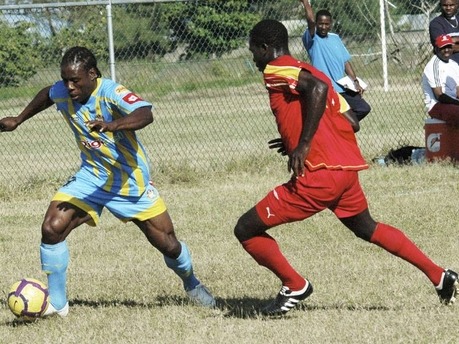The tale of ‘Tuffy’, the warehouse worker who turned Jamaican international
The tale of ‘Tuffy’, the warehouse worker who turned Jamaican international

The tale of ‘Tuffy’, the warehouse worker who turned Jamaican international
By Nathan Carr
Jermaine ‘Tuffy’ Anderson is labouring hard in a large warehouse where he works; pushing crates, moving pipes, keeping himself busy. Today the Red Stripe Premier League has paid a visit to the Jamaican to find out a bit more about his job and how he uses it to help him in football. “I take my work serious. I use this [job] as a jigsaw to keep my body in lift,” he says.
Anderson was speaking in early 2013. This was his primary source of income, and had helped him pay the bills, feed the kids and ultimately live. He had been juggling two commitments for quite some time: basic labour work and playing football. Now Anderson is living the high life, just last week confirming a pro contract had been signed with a club in El Salvador. Now he’s officially a professional footballer. He’s been forced to wave his daytime job goodbye.
The team he has joined is Deportivo Aguila, one of the most successful in El Salvador. They’ve won countless titles and regularly challenge for the domestic title. The move represents a considerable jump for Anderson, who has been so accustomed to playing in the Jamaican Premier League (Red Stripe) for more or less all his life.
Born in Granville, a suburb of Montego Bay, Anderson’s upbringing was tough. With nine sisters and seven brothers, childhood wasn’t always easy. Speaking at the warehouse, he said:
“In life, to me, I never really get the big bursts. I never really grew up with any father, just my mother. So I just use myself as a father and push myself and work hard.”
It’s perhaps this humble attitude that has carried him so far. His first club was Village United, based locally, but he only stayed there for one season. Seba United – since renamed Montego Bay United - were apparently interested in acquiring his services, and off he went in 2003. But Anderson failed to settle and at the end of the year he departed again, this time to Wadadah.
He improved there, but in the 2006-2007 season the club were condemned to relegation and understandably, Anderson wanted to play in the top tier. He knew he would need to play at the highest level if he wanted to go places. So in came Waterhouse and the rest is history.
In a five year spell with Waterhouse, he scored 52 goals in 98 appearances, finishing top goal-scorer in the Red Stripe Premier League for three successive seasons (2010-11, 2011-12 and 2012-13) and as a result, turned into a local football hero. Arguably, his most prolific was campaign was in 2012-12 where he bagged 21 goals and cemented his popularity with the supporters.
This season, before he exited for El Salvador, he had six goals to his name. His instinctive nature, poise and power in front of goal made it almost unstoppable for any defender to shut him down. Quite simply, he tore the division apart.
His name would ring around local football stadiums in Jamaica. “Tuffy! Tuffy! Tuffy!”. ‘Tuffy’ is Anderson’s nickname and has stuck with him ever since he was a child.
“When I was a little boy growing up I used to play ball and I got a lot of kick when I was starting to play football. From the day I come out of my mother I get that name.“
Now 34, Anderson’s move away to a fresh environment brings a new challenge, culture and way of life. If he would have left it any longer then it would have been too late. When the opportunity to sign a pro contract arises, very rarely would it be rejected. Anderson has grafted hard for this chance and has proved he is still capable of doing what he does best, even though he’s getting on. And that’s scoring goals.
At Aguila, there are three other foreign players: one from Colombia, one from Brazil and the other from United States. He doesn’t speak any Spanish and will have to adapt. Not just with the language barrier but also with his play on the field. The striker has been known to be a little temperamental and petulant and that is an element of his game he must eradicate.
There aren’t many cases of Jamaican-born footballers who move out of the island to play abroad. The highest profile type of this transfer is Ricardo Gardner’s move to Bolton Wanderers. Back in 1998, ‘Bibi’ left Harbour View for Bolton in England for a fee of £1million following his glowing performances in the ’98 World Cup for the national team. This is very rare, because there typically isn’t enough exposure or quality in Jamaica’s domestic divisions to attract overseas buyers, so Anderson is a genuine exception.
His move to Central America for pastures new can provide inspiration for fellow Red Stripe players. Those yearning for a pro contract abroad can look up to Anderson, whose own hard work and patience has paid dividends.
How about Tuffy’s experience with the national team? Well, it’s fair to say Anderson has been criminally underused by Jamaica over the years. Since making a debut in 2002, he’s made a meager eleven appearances, scoring twice. You could say there have just been better players in that position. But Jamaica has never really had an out-and-out goal-getter. A prolific marksman who can bang them in frequently; someone to lead the line and grab a game by the scruff of its neck. Luton Shelton is the country’s all-time leading scorer with 35 goals in just over 70 appearances. Even now, at 28, he is a bit-part player. Theo Robinson, Jermaine Beckford and Marlon King were all born in England and are relatively recent additions to the national squad. Yet there is marginal difference between them and Anderson who, if handed a longer run in the side, would undoubtedly come up trumps.
In June last year, a group of Waterhouse fans staged a vehement protest, advocating the inclusion of their star player Tuffy in the national squad. Jamaica was in the middle of a poor losing streak in Hexagonal World Cup qualifying. Defeat to Honduras in San Pedro Sula was still very much fresh in the minds of the ‘Reggae Boyz’ faithful, and with goals scarce, the fans clamored for a striker who could put the ball in the back of the net.
Anderson was in fine form for Waterhouse and eventually, manager Winfried Schäfer granted the fans their wish and called him up for fixtures against both Panama and Costa Rica. It was against the Costa Ricans when Anderson really made his mark. Trailing by one goal, Jamaica needed a goal to keep their slender World Cup dreams alive and as a long ball was hoisted up field, there was only one man in the stadium in Kingston who was going to meet it.
Anderson reached out a leg and guided his effort into the bottom corner to give the 'Reggae Boyz’ a late, late draw. It didn’t mean much in the grand scheme of things in terms of qualification for Brazil; however, it vindicated the German manager’s decision to include him. Age is just a number, after all.
What it also did was throw up the debate over whether Jamaica should bother recruiting players who aren’t born on the island but have Jamaican roots. A significant part of the squad is comprised of English-born players who are made up of Jamaican origin. This has led to friction concerning their involvement and split opinions from fans on whether it’s an effective system or just an easy route out of focusing on the home-grown talent.
Lloyd B Smith, a member of parliament and deputy speaker of the House of Representatives, wrote on the Jamaica Observer website in October 2013: “The bottom line is that we must begin the challenging process of investing comprehensively in our home-grown talents and stop relying on foreign players.” That is the harsh truth, that is the bottom line. And I make no apology for taking this stance, neither am I being a 'wagonist’, although there are many Jamaicans that have a similar viewpoint.
Lloyd B Smith continued, “If we could have produced a Usain Bolt, now a legendary athlete and world-class figure, why can’t we generate a home-grown team that has the capacity, capability and determination to become World Cup champions? We can do it. Let’s do it!”
This is far too an extensive and detailed topic to go into but his point is noteworthy. Tuffy is a wonderful example of why, sometimes, more emphasis should go on promoting home-grown youths instead of exerting so much energy and money on hunting down foreign imports.
Maybe now, with a new club and clean slate, Anderson can build upon that goal against Costa Rica and really stake a claim for the number one striker’s spot. It is unlikely, with the competition he inevitably has, but it’s worth the try.
It’s been a long time coming but now the man, whom Jamaican football fans so affectionately take to, can safely say he is a professional footballer. From the struggles of childhood in Granville, to backbreaking work in a warehouse, to scoring a last-gasp goal for his country thus becoming a national hero, to playing in front of around 10,000 spectators at the Estadio Juan Francisco Barraza for Aguila - Jermaine ‘Tuffy’ Anderon’s career in football has been one heck of a rollercoaster.
His ascent up the ladder is exemplary and perhaps fittingly, the final words should go to the man himself: “In everything I do I use it as enjoyment and just live life. I’m just ready, fit and working hard to try and progress.”
This piece was written by Nathan Carr, who also runs The Home of Caribbean Football. Comments below please.










